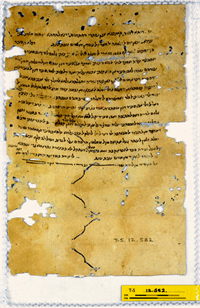Source 4: A Court Deposition from ʿAydhāb
A court deposition taken in the Red Sea port of ʿAydhāb. Twelfth century. Judeo-Arabic.

Translated from the Judeo-Arabic by S. D. Goitein, Letters of Medieval Jewish Traders (Princeton: Princeton University Press, 1974), 335-338. Cambridge University Library: T-S 12.582. Contributed by Craig Perry.
This deposition was made before us, we, the witnesses signing below. This is what happened.
We were present in ʿAydhāb on Tuesday, the 21st of the month of Tevet of the year [….], when Abū Saʿīd b. Maḥfūz [a Jewish merchant], known as Ibn Jamāhir, appeared before the chief of police [wālī, a Muslim official], and launched a complaint against Ṣāfī, the slave-agent of the elder Abū Saʿīd b. [Joshua b. Dōsā] and appealed for help against him. The governor summoned the slave Sāfī, and the aforementioned Abū Saʿīd procured as witnesses Muslims, some of those with whom he used to associate. They testified in favor of Abū Saʿīd that this Ṣāfī made false accusations against him, and that Ṣāfī had said words which cannot be repeated to the aforementioned Abū Saʿīd, that he called him bad names, saying: “You had a slave girl, made her pregnant, and when she bore you a boy, you abandoned her together with her b[oy] in Berbera.” Abū Saʿīd appealed to the governor for help and demanded satisfaction from his adversary Ṣāfī.
Upon this the chief of police sent a herald to assemble the Jews who happened to be in the town and to bring them before him. Some hid themselves, others were brought into his presence by police. When the chief saw that Abū Saʿīd persisted in his demand for satisfaction, he ordered Ṣāfī to be flogged. But Ṣāfī protested, and shouted: “I am the slave of the head of the rabbinic academy.” Abū Saʿīd declared: “I shall not renounce my claim.” After the flogging, Ṣāfī was put in jail in the presence of his adversary, who had appealed to the chief for help, and in the presence of all the Jews who had come to the audience hall. Before the flogging of the slave Ṣāfī one of the Maghrebi merchants had gone to the chief’s house in order to save the slave. But when Abū Saʿīd ibn Jamāhir learned that he wanted to save the slave, he began to incite some Muslims against the stranger; they gave him trouble and threatened him with fines and other matters, after having made false accusations against him. Ṣāfī was set free from jail only after incurring loss of money.
Discussion Questions
- What are the different conflicts apparent or implied in this court deposition? Between Abū Saʿīd (Ibn Jamāhir) and Ṣāfī? Between Ibn Jamāhir and other Jewish merchants in the city of ʿAydhāb?
- What questions might Zinger’s argument raise about this source?
Related Primary Sources
- ‘No One Sees and Every Man Does as He Sees Fit’: Slavery and Masculinity in the Jewish Community of Medieval Egypt
- Source 1 – A Legal Query to Abraham Maimonides and His Response
- Source 2 – A Petition by the Wife of Abū al-Faraj
- Source 3 – Comments on Medieval Masculinity by Ruth Karras and Oded Zinger
- Source 5 – A Legal Query to Moses Maimonides
- Felix Fabri’s Wanderings in the Holy Land
